Organisational Behaviour and Motivation: A Case Study of Ocado Plc
VerifiedAdded on 2022/09/29
|12
|2714
|72
Report
AI Summary
This report provides a detailed analysis of organisational behaviour and motivation within Ocado Plc. It explores the influence of culture, politics, and power on individual behaviour, examining how these factors impact the company's environment and employee performance. The report delves into various motivational theories, including Maslow's Hierarchy of Needs, ERG Theory, and the Two-Factor Theory, and suggests practical motivational techniques and models like the Expectancy and Equity models suitable for Ocado Plc. Furthermore, the report discusses the importance of effective teamwork, outlining the characteristics of successful teams, team-building theories such as Bruce Tuckman's model and Belbin's Theory, and the impact of organisational behaviour philosophies and concepts. The conclusion emphasizes the significance of establishing a stable work environment and implementing various motivational strategies to enhance employee engagement and productivity within Ocado Plc.
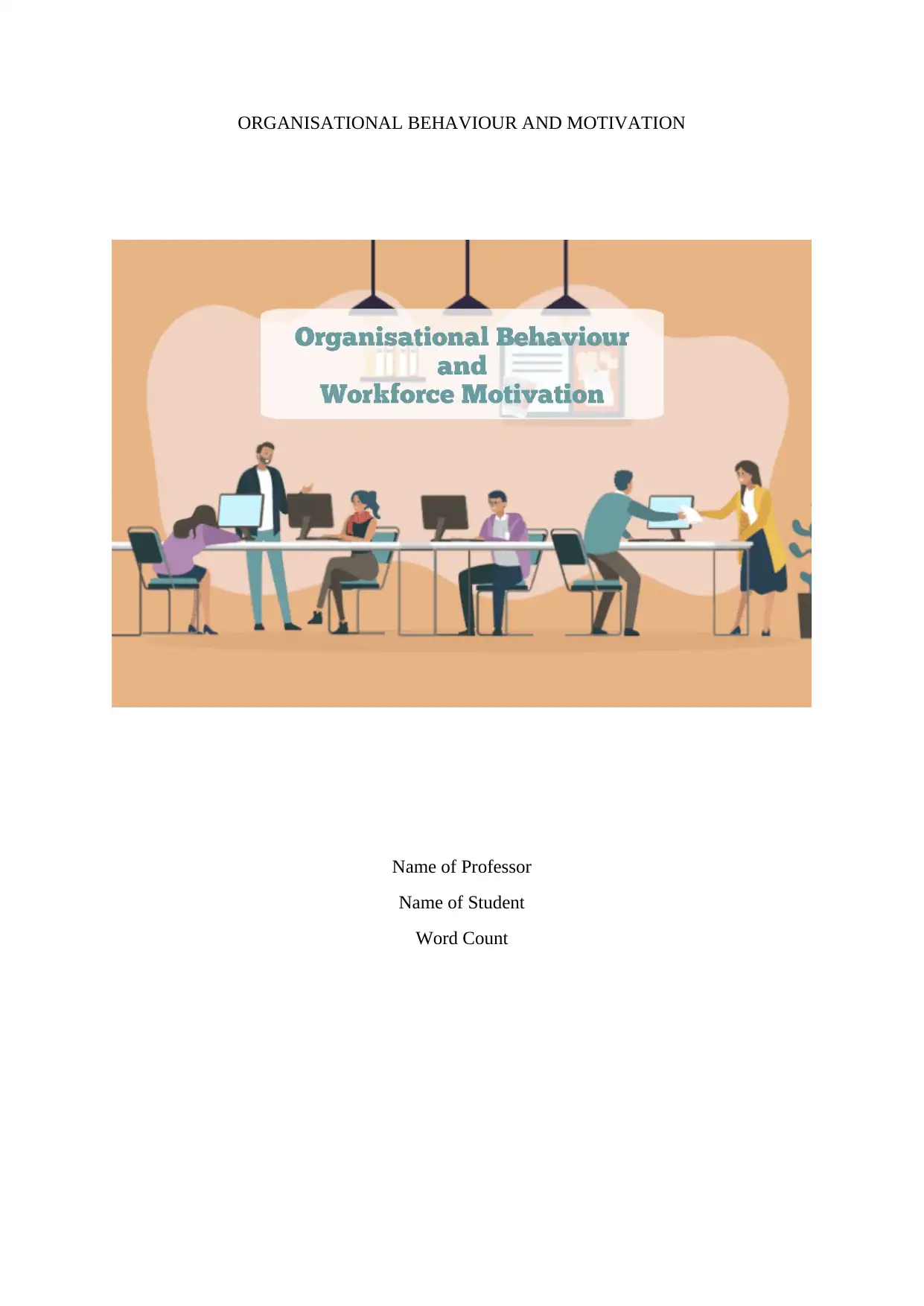
ORGANISATIONAL BEHAVIOUR AND MOTIVATION
Name of Professor
Name of Student
Word Count
Name of Professor
Name of Student
Word Count
Paraphrase This Document
Need a fresh take? Get an instant paraphrase of this document with our AI Paraphraser
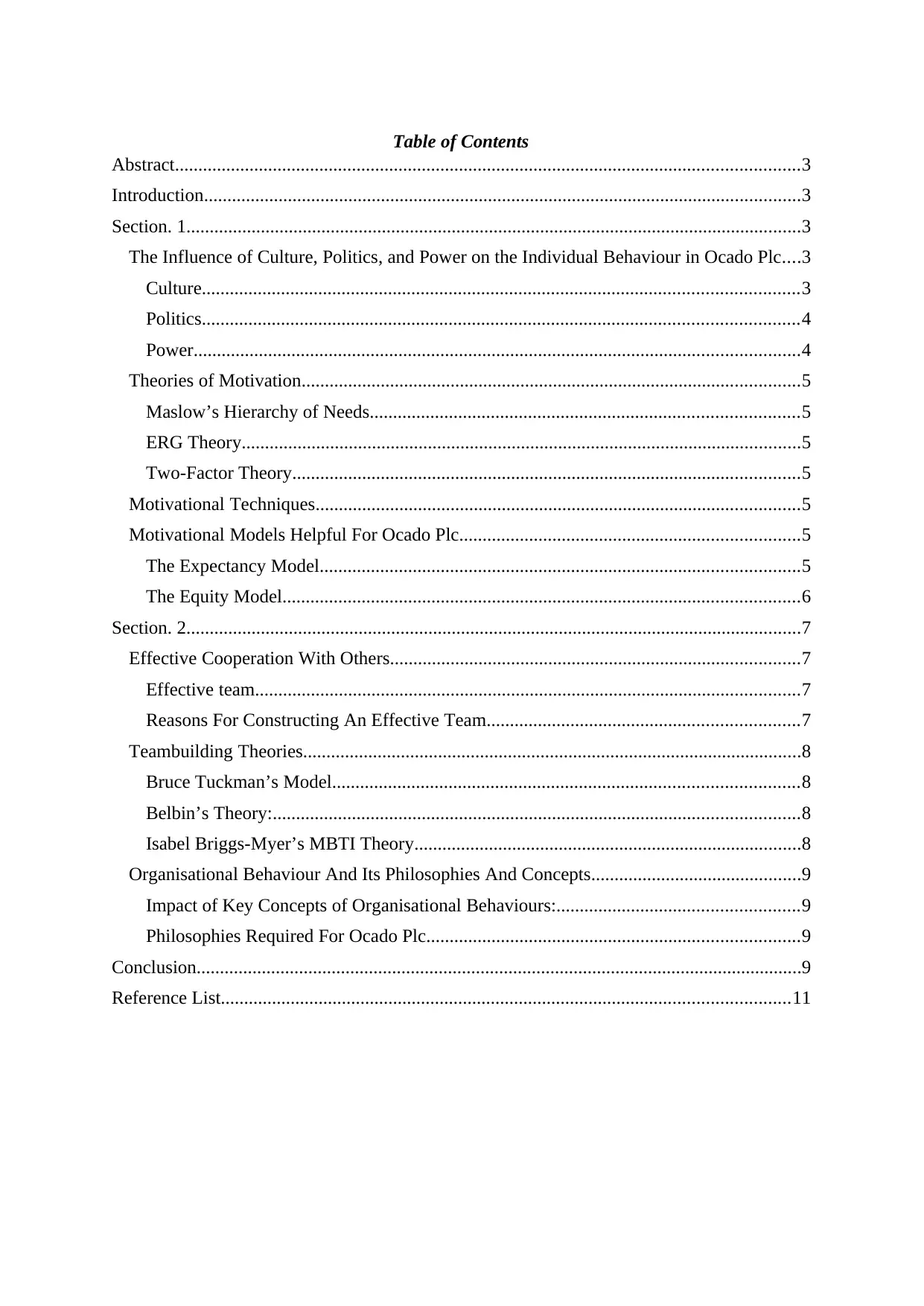
Table of Contents
Abstract......................................................................................................................................3
Introduction................................................................................................................................3
Section. 1....................................................................................................................................3
The Influence of Culture, Politics, and Power on the Individual Behaviour in Ocado Plc....3
Culture................................................................................................................................3
Politics................................................................................................................................4
Power..................................................................................................................................4
Theories of Motivation...........................................................................................................5
Maslow’s Hierarchy of Needs............................................................................................5
ERG Theory........................................................................................................................5
Two-Factor Theory.............................................................................................................5
Motivational Techniques........................................................................................................5
Motivational Models Helpful For Ocado Plc.........................................................................5
The Expectancy Model.......................................................................................................5
The Equity Model...............................................................................................................6
Section. 2....................................................................................................................................7
Effective Cooperation With Others........................................................................................7
Effective team.....................................................................................................................7
Reasons For Constructing An Effective Team...................................................................7
Teambuilding Theories...........................................................................................................8
Bruce Tuckman’s Model....................................................................................................8
Belbin’s Theory:.................................................................................................................8
Isabel Briggs-Myer’s MBTI Theory...................................................................................8
Organisational Behaviour And Its Philosophies And Concepts.............................................9
Impact of Key Concepts of Organisational Behaviours:....................................................9
Philosophies Required For Ocado Plc................................................................................9
Conclusion..................................................................................................................................9
Reference List..........................................................................................................................11
Abstract......................................................................................................................................3
Introduction................................................................................................................................3
Section. 1....................................................................................................................................3
The Influence of Culture, Politics, and Power on the Individual Behaviour in Ocado Plc....3
Culture................................................................................................................................3
Politics................................................................................................................................4
Power..................................................................................................................................4
Theories of Motivation...........................................................................................................5
Maslow’s Hierarchy of Needs............................................................................................5
ERG Theory........................................................................................................................5
Two-Factor Theory.............................................................................................................5
Motivational Techniques........................................................................................................5
Motivational Models Helpful For Ocado Plc.........................................................................5
The Expectancy Model.......................................................................................................5
The Equity Model...............................................................................................................6
Section. 2....................................................................................................................................7
Effective Cooperation With Others........................................................................................7
Effective team.....................................................................................................................7
Reasons For Constructing An Effective Team...................................................................7
Teambuilding Theories...........................................................................................................8
Bruce Tuckman’s Model....................................................................................................8
Belbin’s Theory:.................................................................................................................8
Isabel Briggs-Myer’s MBTI Theory...................................................................................8
Organisational Behaviour And Its Philosophies And Concepts.............................................9
Impact of Key Concepts of Organisational Behaviours:....................................................9
Philosophies Required For Ocado Plc................................................................................9
Conclusion..................................................................................................................................9
Reference List..........................................................................................................................11
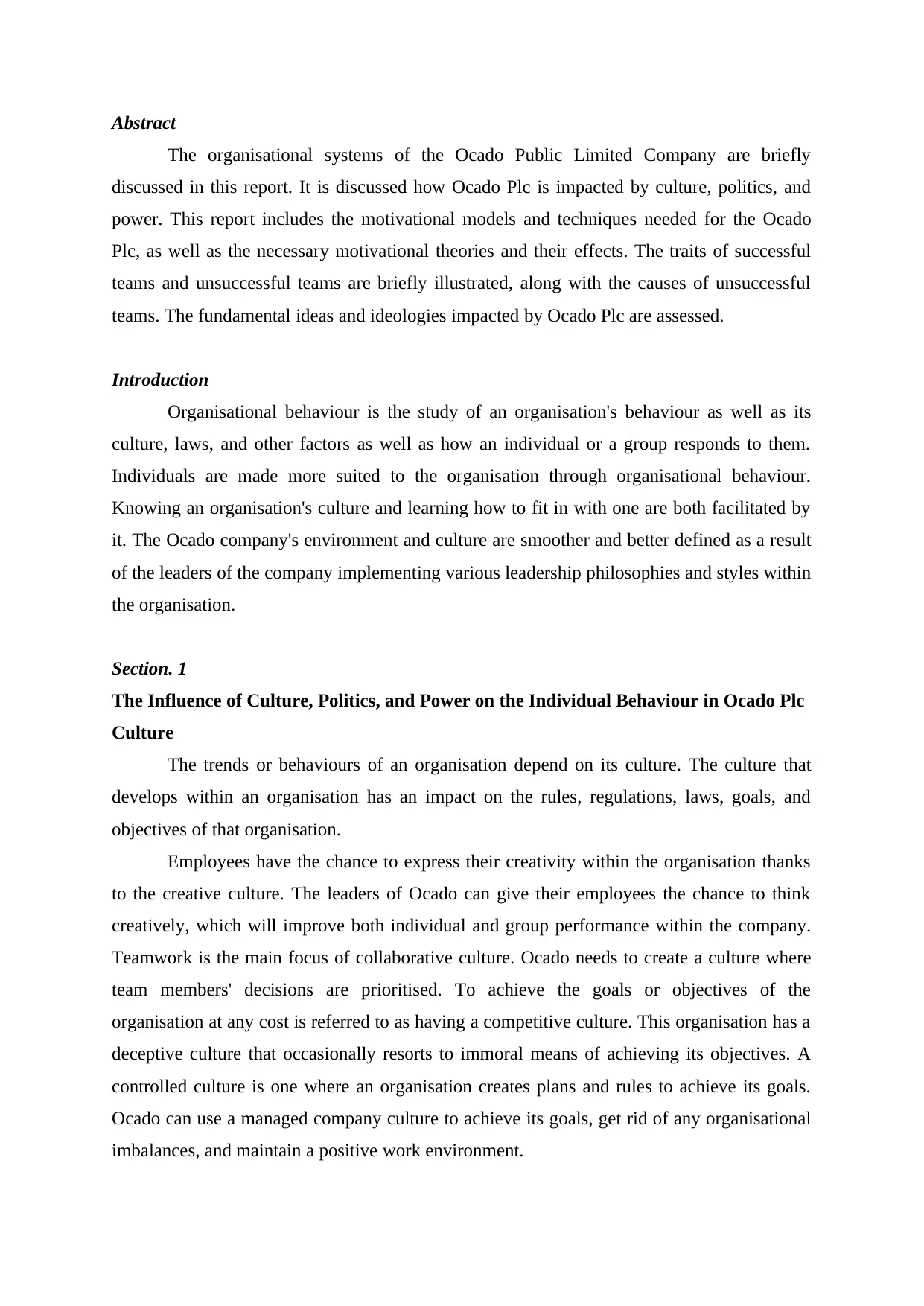
Abstract
The organisational systems of the Ocado Public Limited Company are briefly
discussed in this report. It is discussed how Ocado Plc is impacted by culture, politics, and
power. This report includes the motivational models and techniques needed for the Ocado
Plc, as well as the necessary motivational theories and their effects. The traits of successful
teams and unsuccessful teams are briefly illustrated, along with the causes of unsuccessful
teams. The fundamental ideas and ideologies impacted by Ocado Plc are assessed.
Introduction
Organisational behaviour is the study of an organisation's behaviour as well as its
culture, laws, and other factors as well as how an individual or a group responds to them.
Individuals are made more suited to the organisation through organisational behaviour.
Knowing an organisation's culture and learning how to fit in with one are both facilitated by
it. The Ocado company's environment and culture are smoother and better defined as a result
of the leaders of the company implementing various leadership philosophies and styles within
the organisation.
Section. 1
The Influence of Culture, Politics, and Power on the Individual Behaviour in Ocado Plc
Culture
The trends or behaviours of an organisation depend on its culture. The culture that
develops within an organisation has an impact on the rules, regulations, laws, goals, and
objectives of that organisation.
Employees have the chance to express their creativity within the organisation thanks
to the creative culture. The leaders of Ocado can give their employees the chance to think
creatively, which will improve both individual and group performance within the company.
Teamwork is the main focus of collaborative culture. Ocado needs to create a culture where
team members' decisions are prioritised. To achieve the goals or objectives of the
organisation at any cost is referred to as having a competitive culture. This organisation has a
deceptive culture that occasionally resorts to immoral means of achieving its objectives. A
controlled culture is one where an organisation creates plans and rules to achieve its goals.
Ocado can use a managed company culture to achieve its goals, get rid of any organisational
imbalances, and maintain a positive work environment.
The organisational systems of the Ocado Public Limited Company are briefly
discussed in this report. It is discussed how Ocado Plc is impacted by culture, politics, and
power. This report includes the motivational models and techniques needed for the Ocado
Plc, as well as the necessary motivational theories and their effects. The traits of successful
teams and unsuccessful teams are briefly illustrated, along with the causes of unsuccessful
teams. The fundamental ideas and ideologies impacted by Ocado Plc are assessed.
Introduction
Organisational behaviour is the study of an organisation's behaviour as well as its
culture, laws, and other factors as well as how an individual or a group responds to them.
Individuals are made more suited to the organisation through organisational behaviour.
Knowing an organisation's culture and learning how to fit in with one are both facilitated by
it. The Ocado company's environment and culture are smoother and better defined as a result
of the leaders of the company implementing various leadership philosophies and styles within
the organisation.
Section. 1
The Influence of Culture, Politics, and Power on the Individual Behaviour in Ocado Plc
Culture
The trends or behaviours of an organisation depend on its culture. The culture that
develops within an organisation has an impact on the rules, regulations, laws, goals, and
objectives of that organisation.
Employees have the chance to express their creativity within the organisation thanks
to the creative culture. The leaders of Ocado can give their employees the chance to think
creatively, which will improve both individual and group performance within the company.
Teamwork is the main focus of collaborative culture. Ocado needs to create a culture where
team members' decisions are prioritised. To achieve the goals or objectives of the
organisation at any cost is referred to as having a competitive culture. This organisation has a
deceptive culture that occasionally resorts to immoral means of achieving its objectives. A
controlled culture is one where an organisation creates plans and rules to achieve its goals.
Ocado can use a managed company culture to achieve its goals, get rid of any organisational
imbalances, and maintain a positive work environment.
⊘ This is a preview!⊘
Do you want full access?
Subscribe today to unlock all pages.

Trusted by 1+ million students worldwide
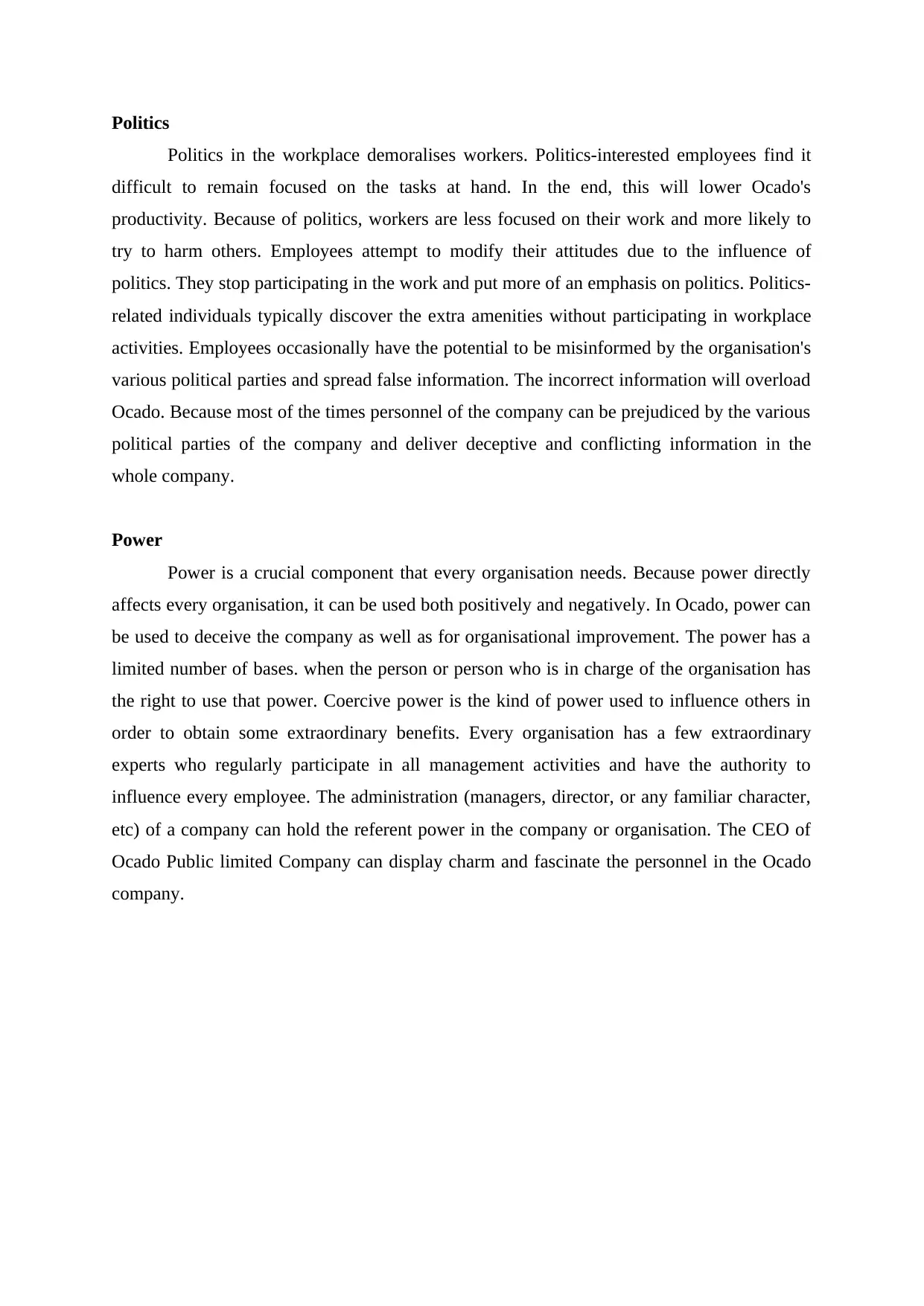
Politics
Politics in the workplace demoralises workers. Politics-interested employees find it
difficult to remain focused on the tasks at hand. In the end, this will lower Ocado's
productivity. Because of politics, workers are less focused on their work and more likely to
try to harm others. Employees attempt to modify their attitudes due to the influence of
politics. They stop participating in the work and put more of an emphasis on politics. Politics-
related individuals typically discover the extra amenities without participating in workplace
activities. Employees occasionally have the potential to be misinformed by the organisation's
various political parties and spread false information. The incorrect information will overload
Ocado. Because most of the times personnel of the company can be prejudiced by the various
political parties of the company and deliver deceptive and conflicting information in the
whole company.
Power
Power is a crucial component that every organisation needs. Because power directly
affects every organisation, it can be used both positively and negatively. In Ocado, power can
be used to deceive the company as well as for organisational improvement. The power has a
limited number of bases. when the person or person who is in charge of the organisation has
the right to use that power. Coercive power is the kind of power used to influence others in
order to obtain some extraordinary benefits. Every organisation has a few extraordinary
experts who regularly participate in all management activities and have the authority to
influence every employee. The administration (managers, director, or any familiar character,
etc) of a company can hold the referent power in the company or organisation. The CEO of
Ocado Public limited Company can display charm and fascinate the personnel in the Ocado
company.
Politics in the workplace demoralises workers. Politics-interested employees find it
difficult to remain focused on the tasks at hand. In the end, this will lower Ocado's
productivity. Because of politics, workers are less focused on their work and more likely to
try to harm others. Employees attempt to modify their attitudes due to the influence of
politics. They stop participating in the work and put more of an emphasis on politics. Politics-
related individuals typically discover the extra amenities without participating in workplace
activities. Employees occasionally have the potential to be misinformed by the organisation's
various political parties and spread false information. The incorrect information will overload
Ocado. Because most of the times personnel of the company can be prejudiced by the various
political parties of the company and deliver deceptive and conflicting information in the
whole company.
Power
Power is a crucial component that every organisation needs. Because power directly
affects every organisation, it can be used both positively and negatively. In Ocado, power can
be used to deceive the company as well as for organisational improvement. The power has a
limited number of bases. when the person or person who is in charge of the organisation has
the right to use that power. Coercive power is the kind of power used to influence others in
order to obtain some extraordinary benefits. Every organisation has a few extraordinary
experts who regularly participate in all management activities and have the authority to
influence every employee. The administration (managers, director, or any familiar character,
etc) of a company can hold the referent power in the company or organisation. The CEO of
Ocado Public limited Company can display charm and fascinate the personnel in the Ocado
company.
Paraphrase This Document
Need a fresh take? Get an instant paraphrase of this document with our AI Paraphraser
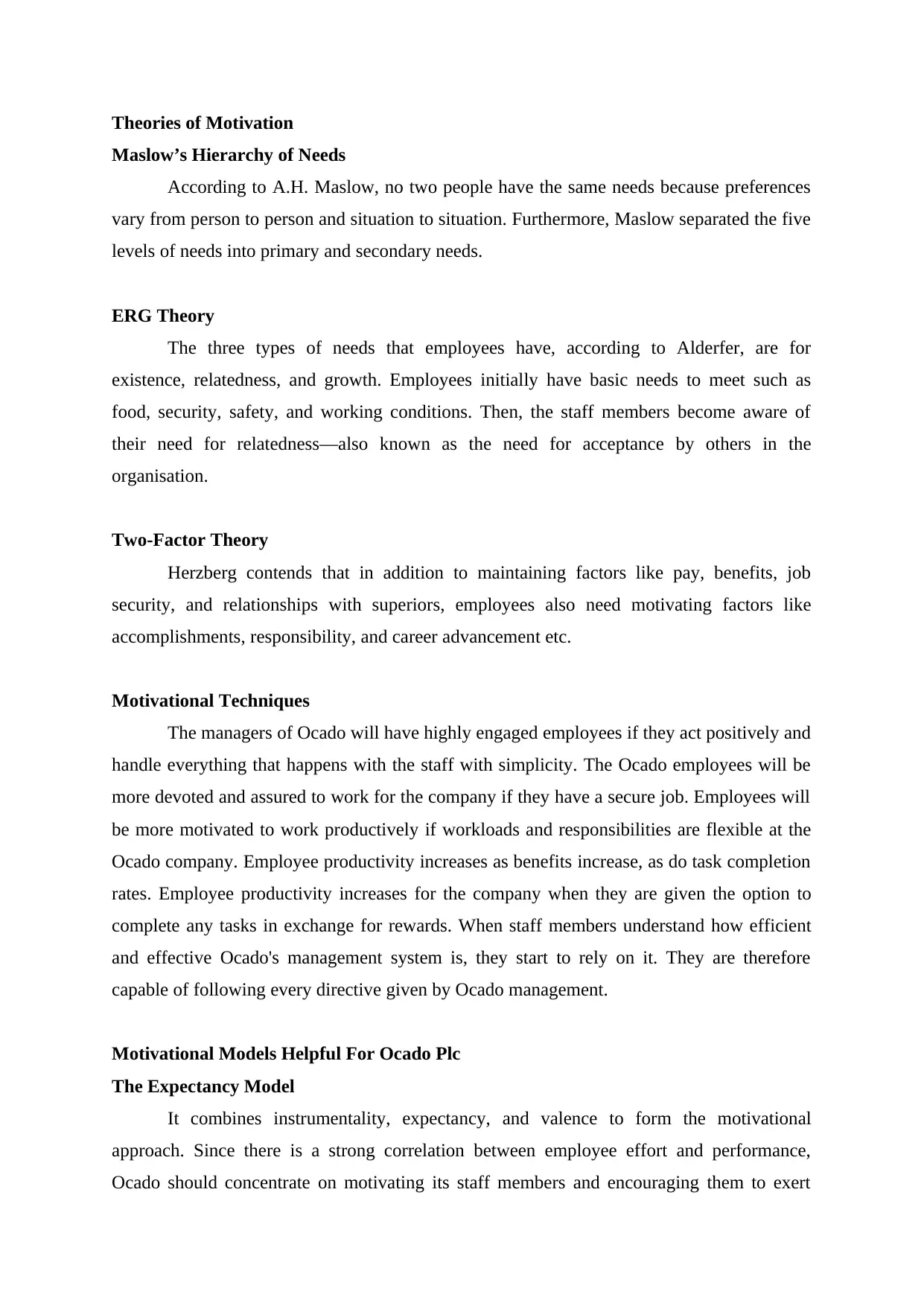
Theories of Motivation
Maslow’s Hierarchy of Needs
According to A.H. Maslow, no two people have the same needs because preferences
vary from person to person and situation to situation. Furthermore, Maslow separated the five
levels of needs into primary and secondary needs.
ERG Theory
The three types of needs that employees have, according to Alderfer, are for
existence, relatedness, and growth. Employees initially have basic needs to meet such as
food, security, safety, and working conditions. Then, the staff members become aware of
their need for relatedness—also known as the need for acceptance by others in the
organisation.
Two-Factor Theory
Herzberg contends that in addition to maintaining factors like pay, benefits, job
security, and relationships with superiors, employees also need motivating factors like
accomplishments, responsibility, and career advancement etc.
Motivational Techniques
The managers of Ocado will have highly engaged employees if they act positively and
handle everything that happens with the staff with simplicity. The Ocado employees will be
more devoted and assured to work for the company if they have a secure job. Employees will
be more motivated to work productively if workloads and responsibilities are flexible at the
Ocado company. Employee productivity increases as benefits increase, as do task completion
rates. Employee productivity increases for the company when they are given the option to
complete any tasks in exchange for rewards. When staff members understand how efficient
and effective Ocado's management system is, they start to rely on it. They are therefore
capable of following every directive given by Ocado management.
Motivational Models Helpful For Ocado Plc
The Expectancy Model
It combines instrumentality, expectancy, and valence to form the motivational
approach. Since there is a strong correlation between employee effort and performance,
Ocado should concentrate on motivating its staff members and encouraging them to exert
Maslow’s Hierarchy of Needs
According to A.H. Maslow, no two people have the same needs because preferences
vary from person to person and situation to situation. Furthermore, Maslow separated the five
levels of needs into primary and secondary needs.
ERG Theory
The three types of needs that employees have, according to Alderfer, are for
existence, relatedness, and growth. Employees initially have basic needs to meet such as
food, security, safety, and working conditions. Then, the staff members become aware of
their need for relatedness—also known as the need for acceptance by others in the
organisation.
Two-Factor Theory
Herzberg contends that in addition to maintaining factors like pay, benefits, job
security, and relationships with superiors, employees also need motivating factors like
accomplishments, responsibility, and career advancement etc.
Motivational Techniques
The managers of Ocado will have highly engaged employees if they act positively and
handle everything that happens with the staff with simplicity. The Ocado employees will be
more devoted and assured to work for the company if they have a secure job. Employees will
be more motivated to work productively if workloads and responsibilities are flexible at the
Ocado company. Employee productivity increases as benefits increase, as do task completion
rates. Employee productivity increases for the company when they are given the option to
complete any tasks in exchange for rewards. When staff members understand how efficient
and effective Ocado's management system is, they start to rely on it. They are therefore
capable of following every directive given by Ocado management.
Motivational Models Helpful For Ocado Plc
The Expectancy Model
It combines instrumentality, expectancy, and valence to form the motivational
approach. Since there is a strong correlation between employee effort and performance,
Ocado should concentrate on motivating its staff members and encouraging them to exert
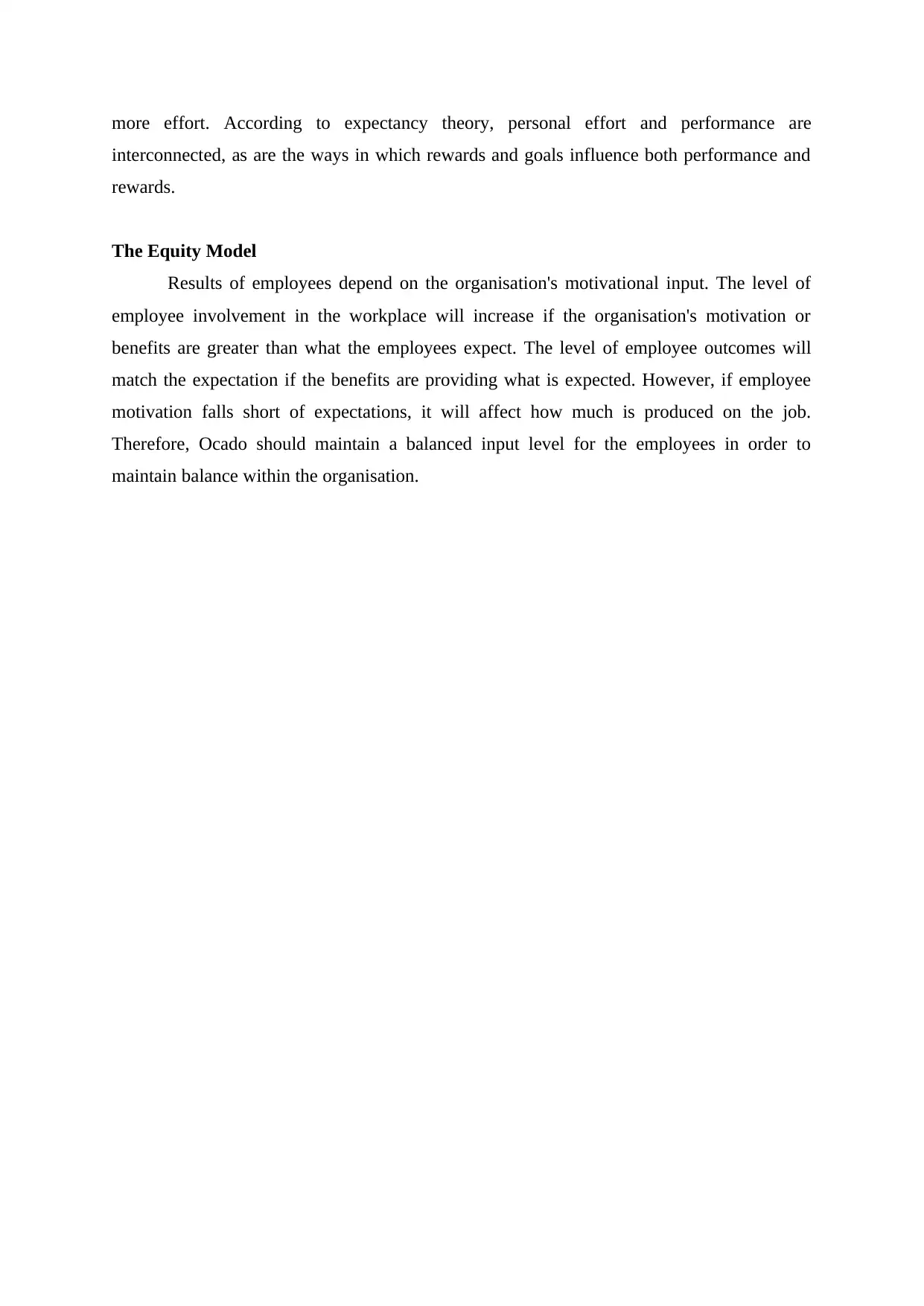
more effort. According to expectancy theory, personal effort and performance are
interconnected, as are the ways in which rewards and goals influence both performance and
rewards.
The Equity Model
Results of employees depend on the organisation's motivational input. The level of
employee involvement in the workplace will increase if the organisation's motivation or
benefits are greater than what the employees expect. The level of employee outcomes will
match the expectation if the benefits are providing what is expected. However, if employee
motivation falls short of expectations, it will affect how much is produced on the job.
Therefore, Ocado should maintain a balanced input level for the employees in order to
maintain balance within the organisation.
interconnected, as are the ways in which rewards and goals influence both performance and
rewards.
The Equity Model
Results of employees depend on the organisation's motivational input. The level of
employee involvement in the workplace will increase if the organisation's motivation or
benefits are greater than what the employees expect. The level of employee outcomes will
match the expectation if the benefits are providing what is expected. However, if employee
motivation falls short of expectations, it will affect how much is produced on the job.
Therefore, Ocado should maintain a balanced input level for the employees in order to
maintain balance within the organisation.
⊘ This is a preview!⊘
Do you want full access?
Subscribe today to unlock all pages.

Trusted by 1+ million students worldwide
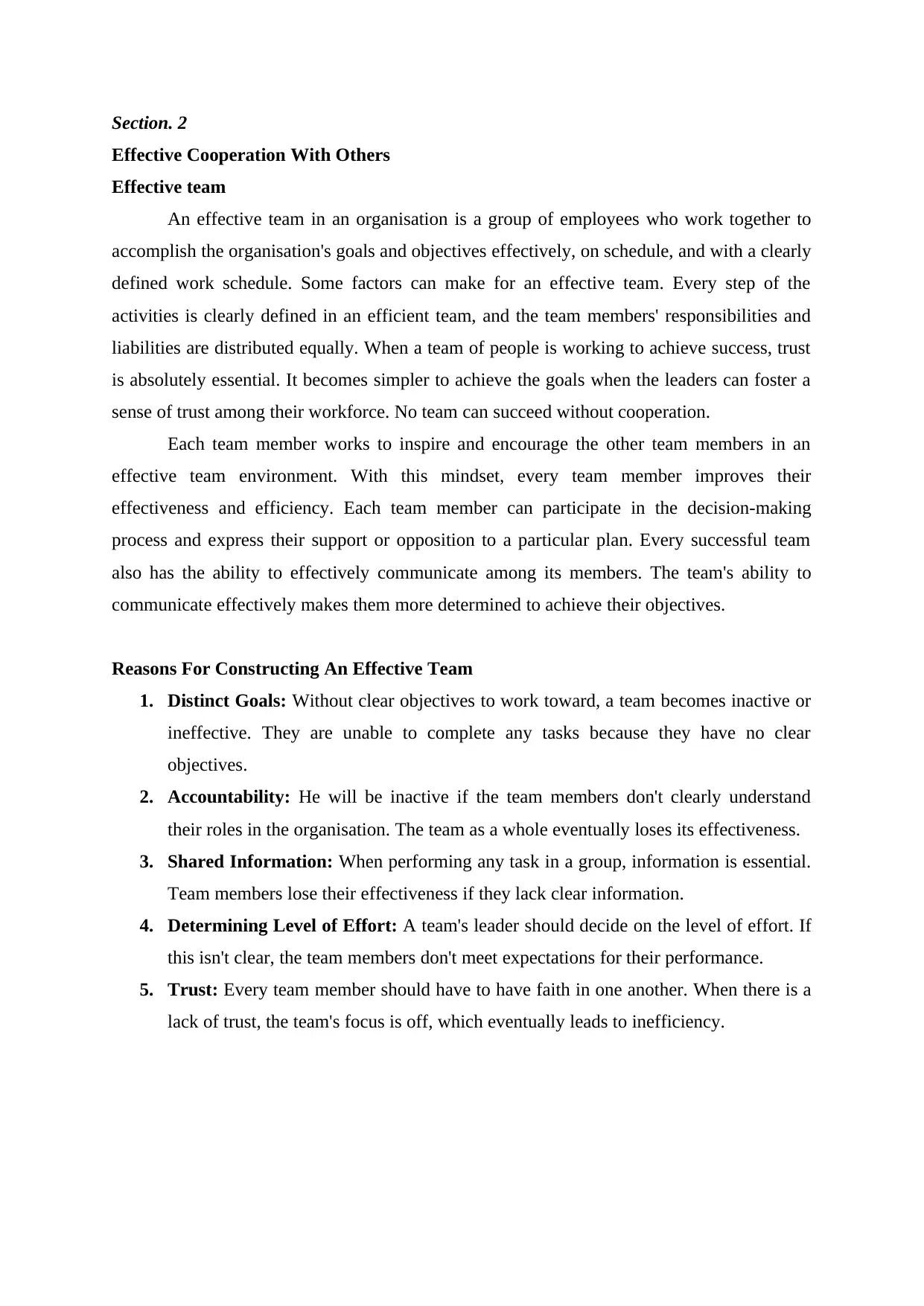
Section. 2
Effective Cooperation With Others
Effective team
An effective team in an organisation is a group of employees who work together to
accomplish the organisation's goals and objectives effectively, on schedule, and with a clearly
defined work schedule. Some factors can make for an effective team. Every step of the
activities is clearly defined in an efficient team, and the team members' responsibilities and
liabilities are distributed equally. When a team of people is working to achieve success, trust
is absolutely essential. It becomes simpler to achieve the goals when the leaders can foster a
sense of trust among their workforce. No team can succeed without cooperation.
Each team member works to inspire and encourage the other team members in an
effective team environment. With this mindset, every team member improves their
effectiveness and efficiency. Each team member can participate in the decision-making
process and express their support or opposition to a particular plan. Every successful team
also has the ability to effectively communicate among its members. The team's ability to
communicate effectively makes them more determined to achieve their objectives.
Reasons For Constructing An Effective Team
1. Distinct Goals: Without clear objectives to work toward, a team becomes inactive or
ineffective. They are unable to complete any tasks because they have no clear
objectives.
2. Accountability: He will be inactive if the team members don't clearly understand
their roles in the organisation. The team as a whole eventually loses its effectiveness.
3. Shared Information: When performing any task in a group, information is essential.
Team members lose their effectiveness if they lack clear information.
4. Determining Level of Effort: A team's leader should decide on the level of effort. If
this isn't clear, the team members don't meet expectations for their performance.
5. Trust: Every team member should have to have faith in one another. When there is a
lack of trust, the team's focus is off, which eventually leads to inefficiency.
Effective Cooperation With Others
Effective team
An effective team in an organisation is a group of employees who work together to
accomplish the organisation's goals and objectives effectively, on schedule, and with a clearly
defined work schedule. Some factors can make for an effective team. Every step of the
activities is clearly defined in an efficient team, and the team members' responsibilities and
liabilities are distributed equally. When a team of people is working to achieve success, trust
is absolutely essential. It becomes simpler to achieve the goals when the leaders can foster a
sense of trust among their workforce. No team can succeed without cooperation.
Each team member works to inspire and encourage the other team members in an
effective team environment. With this mindset, every team member improves their
effectiveness and efficiency. Each team member can participate in the decision-making
process and express their support or opposition to a particular plan. Every successful team
also has the ability to effectively communicate among its members. The team's ability to
communicate effectively makes them more determined to achieve their objectives.
Reasons For Constructing An Effective Team
1. Distinct Goals: Without clear objectives to work toward, a team becomes inactive or
ineffective. They are unable to complete any tasks because they have no clear
objectives.
2. Accountability: He will be inactive if the team members don't clearly understand
their roles in the organisation. The team as a whole eventually loses its effectiveness.
3. Shared Information: When performing any task in a group, information is essential.
Team members lose their effectiveness if they lack clear information.
4. Determining Level of Effort: A team's leader should decide on the level of effort. If
this isn't clear, the team members don't meet expectations for their performance.
5. Trust: Every team member should have to have faith in one another. When there is a
lack of trust, the team's focus is off, which eventually leads to inefficiency.
Paraphrase This Document
Need a fresh take? Get an instant paraphrase of this document with our AI Paraphraser
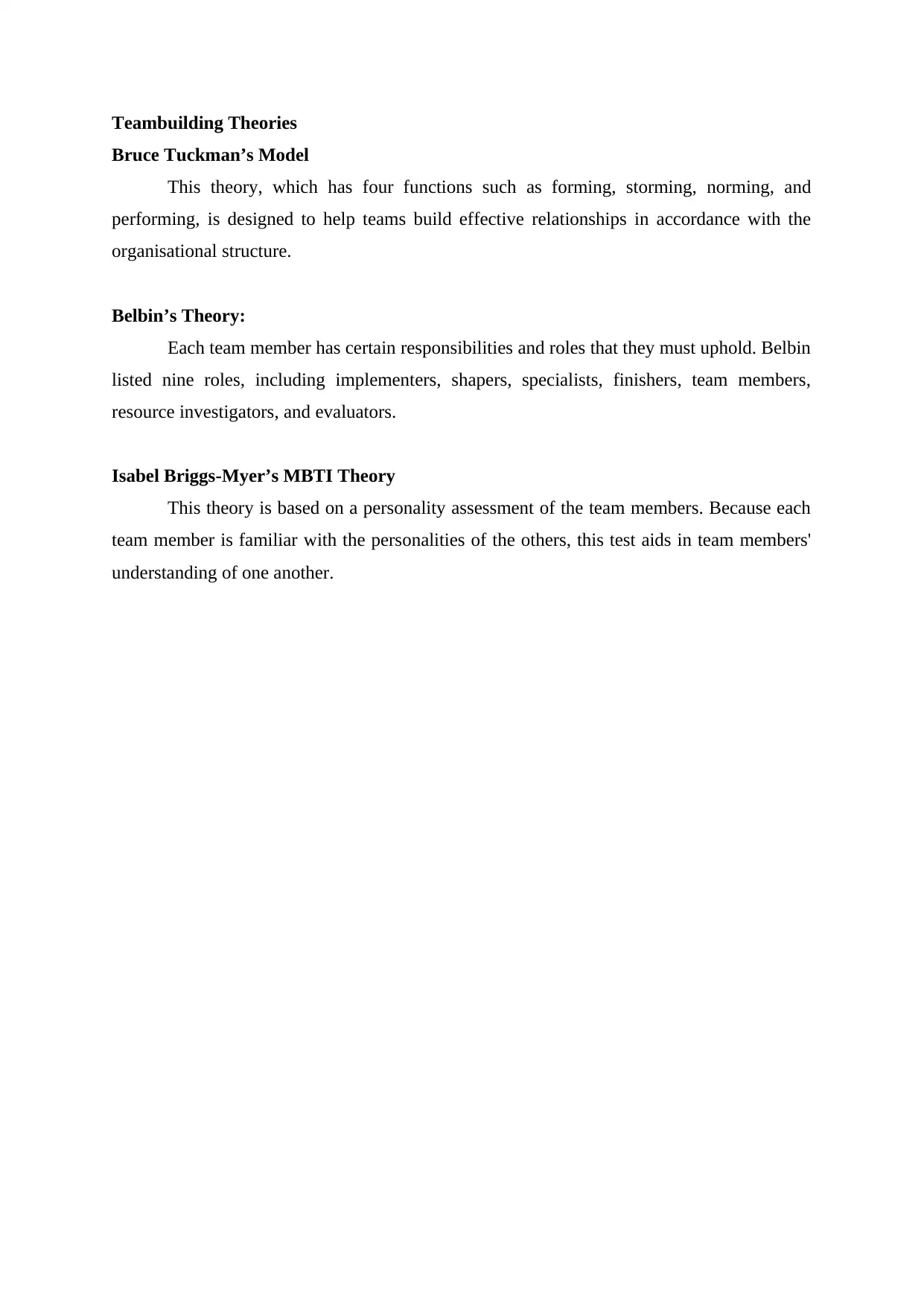
Teambuilding Theories
Bruce Tuckman’s Model
This theory, which has four functions such as forming, storming, norming, and
performing, is designed to help teams build effective relationships in accordance with the
organisational structure.
Belbin’s Theory:
Each team member has certain responsibilities and roles that they must uphold. Belbin
listed nine roles, including implementers, shapers, specialists, finishers, team members,
resource investigators, and evaluators.
Isabel Briggs-Myer’s MBTI Theory
This theory is based on a personality assessment of the team members. Because each
team member is familiar with the personalities of the others, this test aids in team members'
understanding of one another.
Bruce Tuckman’s Model
This theory, which has four functions such as forming, storming, norming, and
performing, is designed to help teams build effective relationships in accordance with the
organisational structure.
Belbin’s Theory:
Each team member has certain responsibilities and roles that they must uphold. Belbin
listed nine roles, including implementers, shapers, specialists, finishers, team members,
resource investigators, and evaluators.
Isabel Briggs-Myer’s MBTI Theory
This theory is based on a personality assessment of the team members. Because each
team member is familiar with the personalities of the others, this test aids in team members'
understanding of one another.
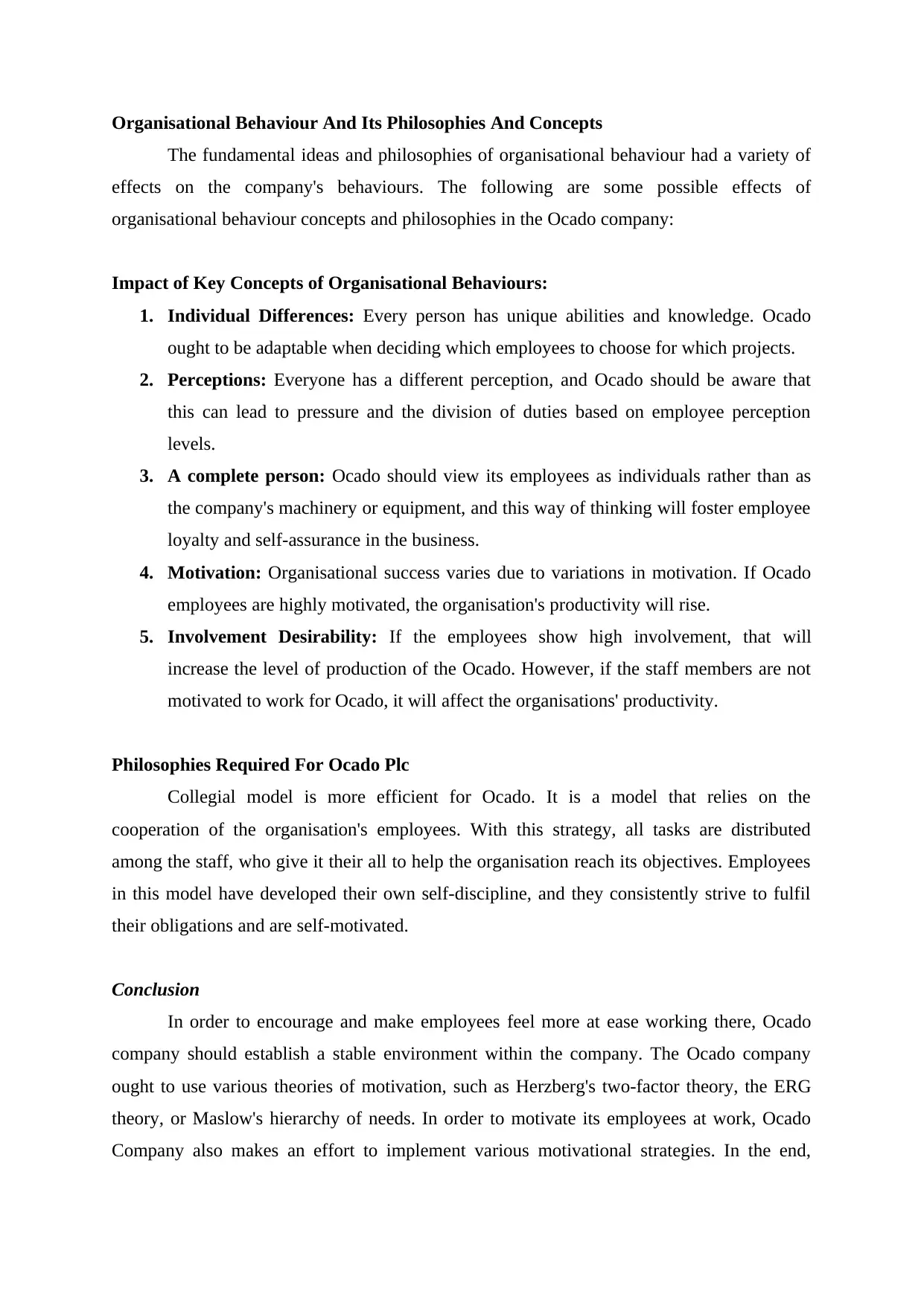
Organisational Behaviour And Its Philosophies And Concepts
The fundamental ideas and philosophies of organisational behaviour had a variety of
effects on the company's behaviours. The following are some possible effects of
organisational behaviour concepts and philosophies in the Ocado company:
Impact of Key Concepts of Organisational Behaviours:
1. Individual Differences: Every person has unique abilities and knowledge. Ocado
ought to be adaptable when deciding which employees to choose for which projects.
2. Perceptions: Everyone has a different perception, and Ocado should be aware that
this can lead to pressure and the division of duties based on employee perception
levels.
3. A complete person: Ocado should view its employees as individuals rather than as
the company's machinery or equipment, and this way of thinking will foster employee
loyalty and self-assurance in the business.
4. Motivation: Organisational success varies due to variations in motivation. If Ocado
employees are highly motivated, the organisation's productivity will rise.
5. Involvement Desirability: If the employees show high involvement, that will
increase the level of production of the Ocado. However, if the staff members are not
motivated to work for Ocado, it will affect the organisations' productivity.
Philosophies Required For Ocado Plc
Collegial model is more efficient for Ocado. It is a model that relies on the
cooperation of the organisation's employees. With this strategy, all tasks are distributed
among the staff, who give it their all to help the organisation reach its objectives. Employees
in this model have developed their own self-discipline, and they consistently strive to fulfil
their obligations and are self-motivated.
Conclusion
In order to encourage and make employees feel more at ease working there, Ocado
company should establish a stable environment within the company. The Ocado company
ought to use various theories of motivation, such as Herzberg's two-factor theory, the ERG
theory, or Maslow's hierarchy of needs. In order to motivate its employees at work, Ocado
Company also makes an effort to implement various motivational strategies. In the end,
The fundamental ideas and philosophies of organisational behaviour had a variety of
effects on the company's behaviours. The following are some possible effects of
organisational behaviour concepts and philosophies in the Ocado company:
Impact of Key Concepts of Organisational Behaviours:
1. Individual Differences: Every person has unique abilities and knowledge. Ocado
ought to be adaptable when deciding which employees to choose for which projects.
2. Perceptions: Everyone has a different perception, and Ocado should be aware that
this can lead to pressure and the division of duties based on employee perception
levels.
3. A complete person: Ocado should view its employees as individuals rather than as
the company's machinery or equipment, and this way of thinking will foster employee
loyalty and self-assurance in the business.
4. Motivation: Organisational success varies due to variations in motivation. If Ocado
employees are highly motivated, the organisation's productivity will rise.
5. Involvement Desirability: If the employees show high involvement, that will
increase the level of production of the Ocado. However, if the staff members are not
motivated to work for Ocado, it will affect the organisations' productivity.
Philosophies Required For Ocado Plc
Collegial model is more efficient for Ocado. It is a model that relies on the
cooperation of the organisation's employees. With this strategy, all tasks are distributed
among the staff, who give it their all to help the organisation reach its objectives. Employees
in this model have developed their own self-discipline, and they consistently strive to fulfil
their obligations and are self-motivated.
Conclusion
In order to encourage and make employees feel more at ease working there, Ocado
company should establish a stable environment within the company. The Ocado company
ought to use various theories of motivation, such as Herzberg's two-factor theory, the ERG
theory, or Maslow's hierarchy of needs. In order to motivate its employees at work, Ocado
Company also makes an effort to implement various motivational strategies. In the end,
⊘ This is a preview!⊘
Do you want full access?
Subscribe today to unlock all pages.

Trusted by 1+ million students worldwide
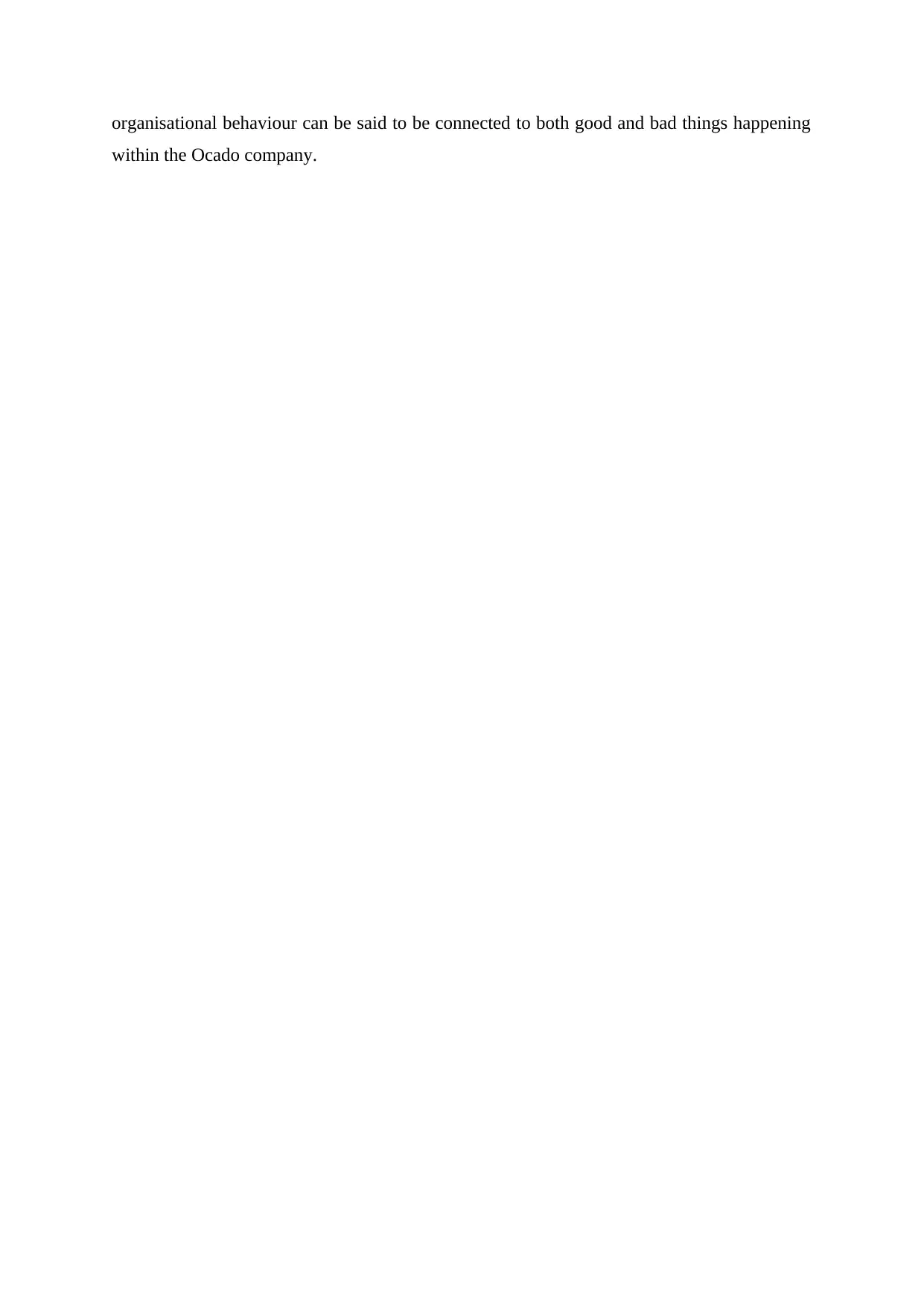
organisational behaviour can be said to be connected to both good and bad things happening
within the Ocado company.
within the Ocado company.
Paraphrase This Document
Need a fresh take? Get an instant paraphrase of this document with our AI Paraphraser
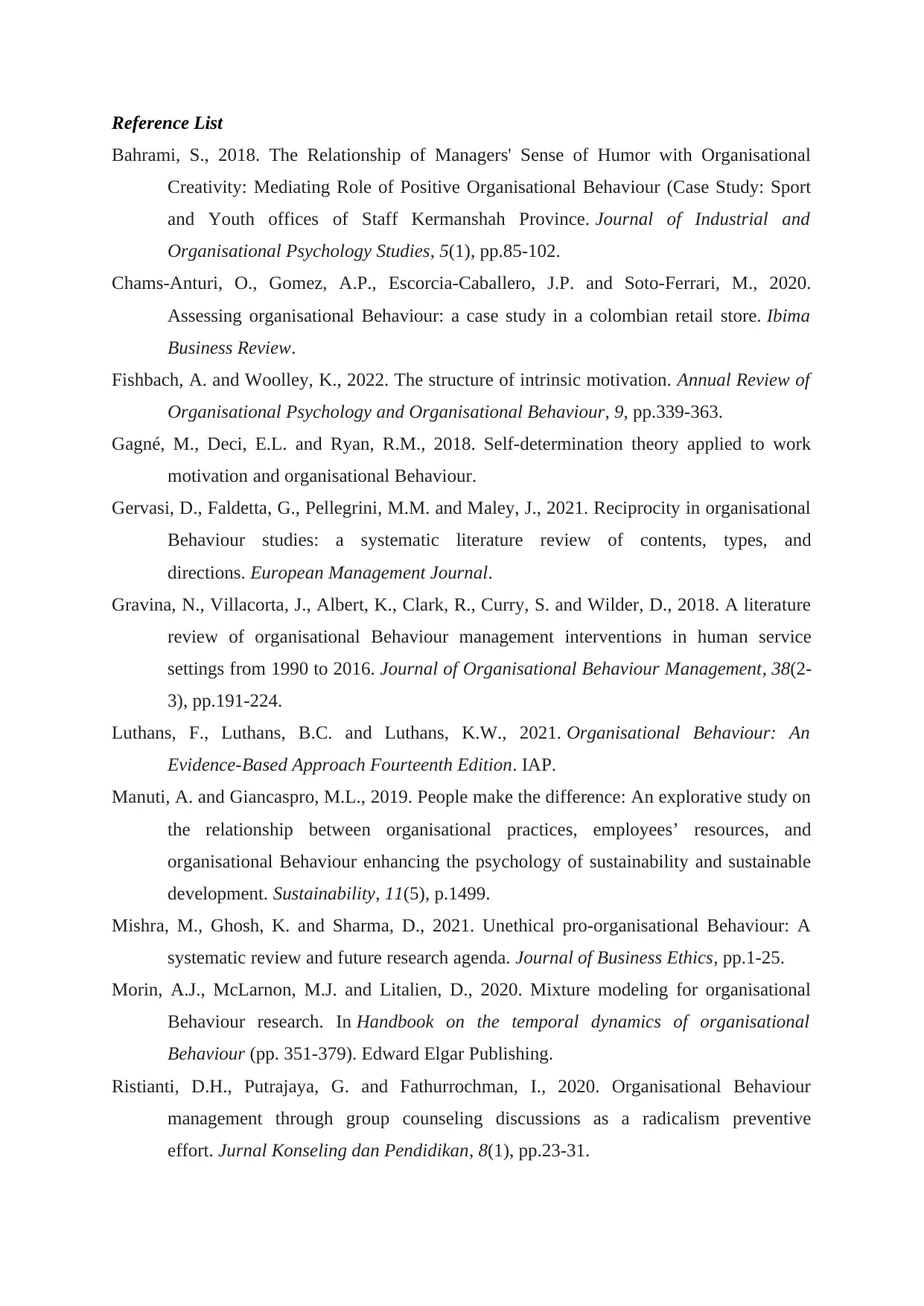
Reference List
Bahrami, S., 2018. The Relationship of Managers' Sense of Humor with Organisational
Creativity: Mediating Role of Positive Organisational Behaviour (Case Study: Sport
and Youth offices of Staff Kermanshah Province. Journal of Industrial and
Organisational Psychology Studies, 5(1), pp.85-102.
Chams-Anturi, O., Gomez, A.P., Escorcia-Caballero, J.P. and Soto-Ferrari, M., 2020.
Assessing organisational Behaviour: a case study in a colombian retail store. Ibima
Business Review.
Fishbach, A. and Woolley, K., 2022. The structure of intrinsic motivation. Annual Review of
Organisational Psychology and Organisational Behaviour, 9, pp.339-363.
Gagné, M., Deci, E.L. and Ryan, R.M., 2018. Self-determination theory applied to work
motivation and organisational Behaviour.
Gervasi, D., Faldetta, G., Pellegrini, M.M. and Maley, J., 2021. Reciprocity in organisational
Behaviour studies: a systematic literature review of contents, types, and
directions. European Management Journal.
Gravina, N., Villacorta, J., Albert, K., Clark, R., Curry, S. and Wilder, D., 2018. A literature
review of organisational Behaviour management interventions in human service
settings from 1990 to 2016. Journal of Organisational Behaviour Management, 38(2-
3), pp.191-224.
Luthans, F., Luthans, B.C. and Luthans, K.W., 2021. Organisational Behaviour: An
Evidence-Based Approach Fourteenth Edition. IAP.
Manuti, A. and Giancaspro, M.L., 2019. People make the difference: An explorative study on
the relationship between organisational practices, employees’ resources, and
organisational Behaviour enhancing the psychology of sustainability and sustainable
development. Sustainability, 11(5), p.1499.
Mishra, M., Ghosh, K. and Sharma, D., 2021. Unethical pro-organisational Behaviour: A
systematic review and future research agenda. Journal of Business Ethics, pp.1-25.
Morin, A.J., McLarnon, M.J. and Litalien, D., 2020. Mixture modeling for organisational
Behaviour research. In Handbook on the temporal dynamics of organisational
Behaviour (pp. 351-379). Edward Elgar Publishing.
Ristianti, D.H., Putrajaya, G. and Fathurrochman, I., 2020. Organisational Behaviour
management through group counseling discussions as a radicalism preventive
effort. Jurnal Konseling dan Pendidikan, 8(1), pp.23-31.
Bahrami, S., 2018. The Relationship of Managers' Sense of Humor with Organisational
Creativity: Mediating Role of Positive Organisational Behaviour (Case Study: Sport
and Youth offices of Staff Kermanshah Province. Journal of Industrial and
Organisational Psychology Studies, 5(1), pp.85-102.
Chams-Anturi, O., Gomez, A.P., Escorcia-Caballero, J.P. and Soto-Ferrari, M., 2020.
Assessing organisational Behaviour: a case study in a colombian retail store. Ibima
Business Review.
Fishbach, A. and Woolley, K., 2022. The structure of intrinsic motivation. Annual Review of
Organisational Psychology and Organisational Behaviour, 9, pp.339-363.
Gagné, M., Deci, E.L. and Ryan, R.M., 2018. Self-determination theory applied to work
motivation and organisational Behaviour.
Gervasi, D., Faldetta, G., Pellegrini, M.M. and Maley, J., 2021. Reciprocity in organisational
Behaviour studies: a systematic literature review of contents, types, and
directions. European Management Journal.
Gravina, N., Villacorta, J., Albert, K., Clark, R., Curry, S. and Wilder, D., 2018. A literature
review of organisational Behaviour management interventions in human service
settings from 1990 to 2016. Journal of Organisational Behaviour Management, 38(2-
3), pp.191-224.
Luthans, F., Luthans, B.C. and Luthans, K.W., 2021. Organisational Behaviour: An
Evidence-Based Approach Fourteenth Edition. IAP.
Manuti, A. and Giancaspro, M.L., 2019. People make the difference: An explorative study on
the relationship between organisational practices, employees’ resources, and
organisational Behaviour enhancing the psychology of sustainability and sustainable
development. Sustainability, 11(5), p.1499.
Mishra, M., Ghosh, K. and Sharma, D., 2021. Unethical pro-organisational Behaviour: A
systematic review and future research agenda. Journal of Business Ethics, pp.1-25.
Morin, A.J., McLarnon, M.J. and Litalien, D., 2020. Mixture modeling for organisational
Behaviour research. In Handbook on the temporal dynamics of organisational
Behaviour (pp. 351-379). Edward Elgar Publishing.
Ristianti, D.H., Putrajaya, G. and Fathurrochman, I., 2020. Organisational Behaviour
management through group counseling discussions as a radicalism preventive
effort. Jurnal Konseling dan Pendidikan, 8(1), pp.23-31.
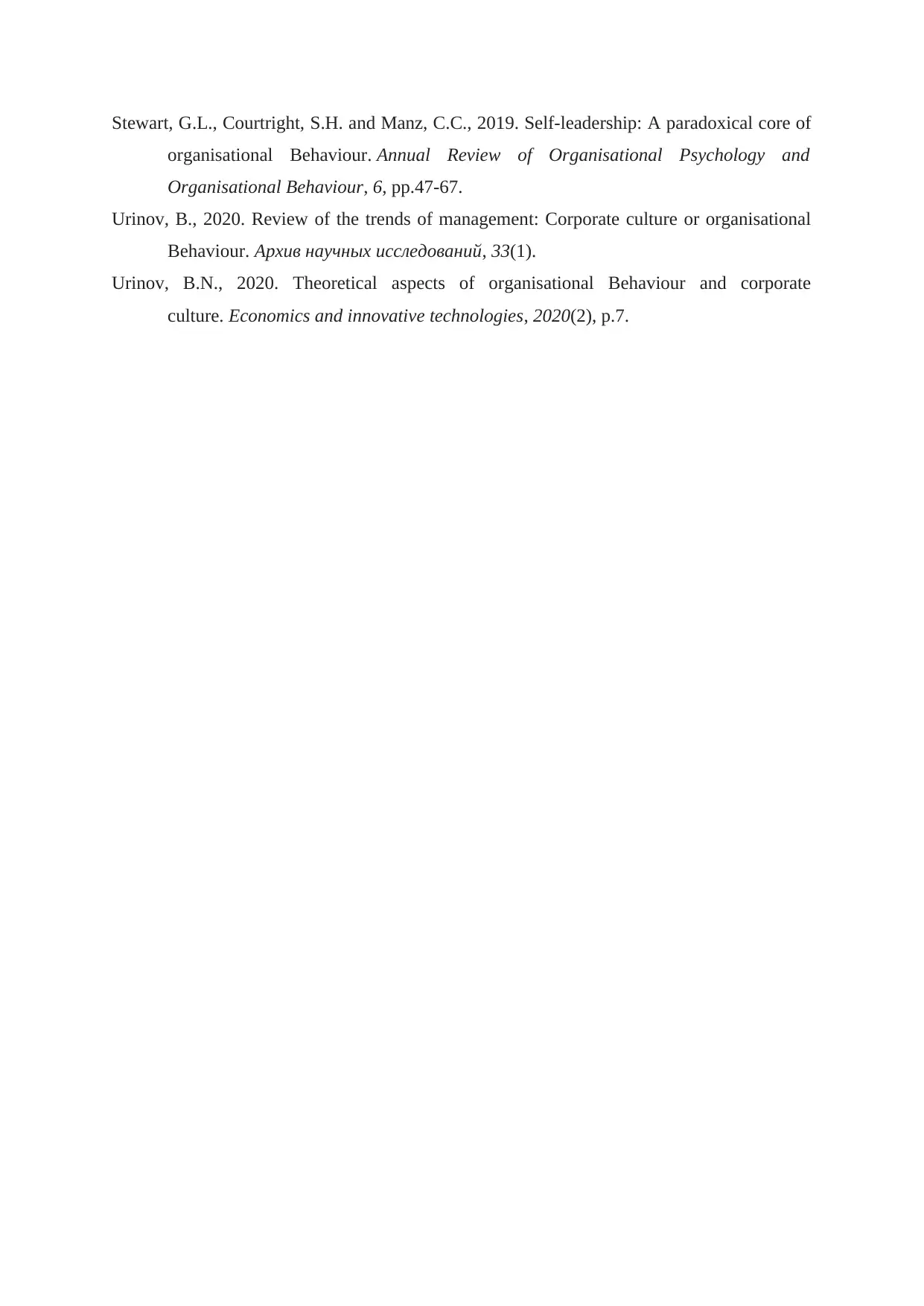
Stewart, G.L., Courtright, S.H. and Manz, C.C., 2019. Self-leadership: A paradoxical core of
organisational Behaviour. Annual Review of Organisational Psychology and
Organisational Behaviour, 6, pp.47-67.
Urinov, B., 2020. Review of the trends of management: Corporate culture or organisational
Behaviour. Архив научных исследований, 33(1).
Urinov, B.N., 2020. Theoretical aspects of organisational Behaviour and corporate
culture. Economics and innovative technologies, 2020(2), p.7.
organisational Behaviour. Annual Review of Organisational Psychology and
Organisational Behaviour, 6, pp.47-67.
Urinov, B., 2020. Review of the trends of management: Corporate culture or organisational
Behaviour. Архив научных исследований, 33(1).
Urinov, B.N., 2020. Theoretical aspects of organisational Behaviour and corporate
culture. Economics and innovative technologies, 2020(2), p.7.
⊘ This is a preview!⊘
Do you want full access?
Subscribe today to unlock all pages.

Trusted by 1+ million students worldwide
1 out of 12
Related Documents
Your All-in-One AI-Powered Toolkit for Academic Success.
+13062052269
info@desklib.com
Available 24*7 on WhatsApp / Email
![[object Object]](/_next/static/media/star-bottom.7253800d.svg)
Unlock your academic potential
Copyright © 2020–2026 A2Z Services. All Rights Reserved. Developed and managed by ZUCOL.




